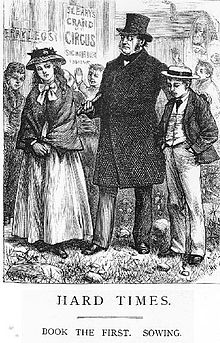Time to Go to That There Burying-Ground: Dickens’ 200th Birthday
Ralph Fiennes reads a moving excerpt from Bleak House as Prince Charles lays a wreath of flowers on Dickens’ grave.
Today the world remembers Charles Dickens, born on this day two hundred years ago. I have a great fondness for Dickens’s works, especially David Copperfield and Hard Times.
One of Dickens’ particular qualities was the ability to make one laugh and shudder at the same time. As Chesterton says, “These two primary dispositions of Dickens, to make the flesh creep and to make the sides ache, were a sort of twins of his spirit; they were never far apart…”
Consider the opening of Hard Times:
‘NOW, what I want is, Facts. Teach these boys and girls nothing but Facts. Facts alone are wanted in life. Plant nothing else, and root out everything else. You can only form the minds of reasoning animals upon Facts: nothing else will ever be of any service to them. This is the principle on which I bring up my own children, and this is the principle on which I bring up these children. Stick to Facts, sir!’
The scene was a plain, bare, monotonous vault of a school-room, and the speaker’s square forefinger emphasized his observations by underscoring every sentence with a line on the schoolmaster’s sleeve. The emphasis was helped by the speaker’s square wall of a forehead, which had his eyebrows for its base, while his eyes found commodious cellarage in two dark caves, overshadowed by the wall. The emphasis was helped by the speaker’s mouth, which was wide, thin, and hard set. The emphasis was helped by the speaker’s voice, which was inflexible, dry, and dictatorial. The emphasis was helped by the speaker’s hair, which bristled on the skirts of his bald head, a plantation of firs to keep the wind from its shining surface, all covered with knobs, like the crust of a plum pie, as if the head had scarcely warehouse-room for the hard facts stored inside. The speaker’s obstinate carriage, square coat, square legs, square shoulders, – nay, his very neckcloth, trained to take him by the throat with an unaccommodating grasp, like a stubborn fact, as it was, – all helped the emphasis.
‘In this life, we want nothing but Facts, sir; nothing but Facts!’
The speaker, and the schoolmaster, and the third grown person present, all backed a little, and swept with their eyes the inclined plane of little vessels then and there arranged in order, ready to have imperial gallons of facts poured into them until they were full to the brim.
Horrifying, indeed, and yet humorous at the same time.
Another of his considerable talents was his enormous creative output, especially his characters. Again, from Chesterton:
There is no way of dealing properly with the ultimate greatness of Dickens, except by offering sacrifice to him as a god; and this is opposed to the etiquette of our time….One of the godlike things about Dickens is his quantity, his quantity as such, the enormous output, the incredible fecundity of his invention, I have said a moment ago that not one of us could have invented Mr. Guppy. But even if we could have stolen Mr. Guppy from Dickens we have still to confront the fact that Dickens would have been able to invent another quite inconceivable character to take his place. Perhaps we could have created Mr. Guppy; but the effort would certainly have exhausted us; we should be ever afterwards wheeled about in a bath-chair at Bournemouth….It is impossible to do justice to these figures because the essential of them is their multiplicity. The whole point of Dickens is that he not only made them, but made them by myriads; that he stamped his foot, and armies came out of the earth.
Scrooge, Fagin, Macawber, Uriah Heep, Pip, Estella, Tiny Tim–even his minor characters leap off the page.
So Happy 200th, Mr. Dickens. Here’s hoping people are still reading you in another 200 years.
































